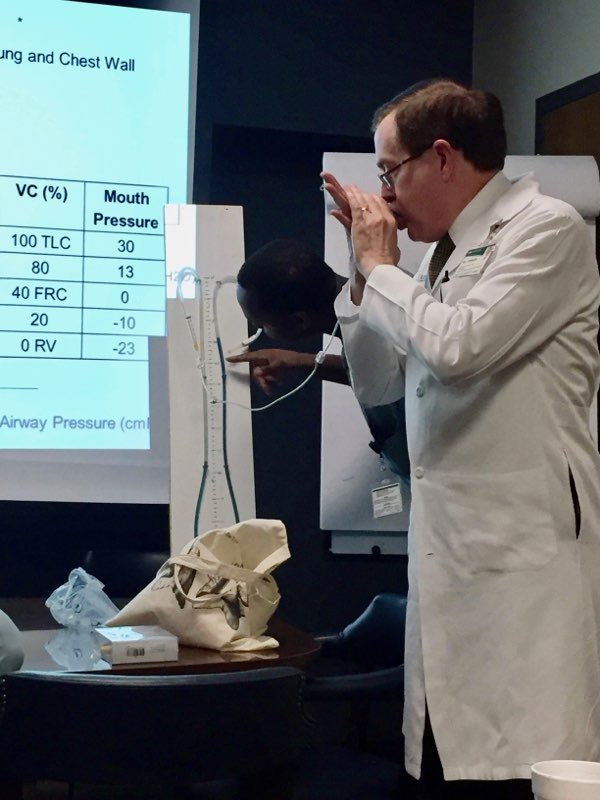Fellows must accumulate at least 12 months of direct clinical experience in Pulmonary Disease (PD) on Wards and Consultations during the 36-month program to apply for Board Exams in Pulmonary Disease. Eligibility in Critical Care Medicine (CCM) also requires at least 12 months additional clinical experience in Intensive Care Units.
In our three-year combined Pulmonary Disease and Critical Care Medicine training program, six months of qualifying clinical training can be applied to both PD and CCM, thus allowing 18 months of clinical training to suffice for the usual 24 months required for Pulmonary Disease and Critical Care Medicine.
The first year curriculum and a portion of the second year curriculum are oriented toward the clinical aspects of Pulmonary Disease and Critical Care Medicine. During the second and third years, fellows will have the opportunity to have up to 18 months of research and elective time depending on their career pathway.
Fellows spend one half-day a week in an outpatient setting following their own panel of patients. Opportunities for participation in subspecialty clinics (ILD, asthma, CF, etc.) are available during the second and third year. Participation in conferences and teaching activities spans the full three years.
-
First Year Curriculum
The first year of fellowship is a clinical year with rotations at University Hospital (UH) and the Birmingham VA Medical Center (BVAMC). At the University Hospital, fellows will rotation in the UH MICUs, Transplant and ECMO, Consultative services in Pulmonary and Critical Care, Long Term Ventilator Weaning Unit, Interventional Pulmonary and our Medical Emergency Team. Fellows also rotate through the BVAMC MICU and Pulmonary Consult Service. Fellows will have 5-6 weeks of Night Float responsibilities.
-
Second Year Curriculum
Second year fellows will spend approximately half of the year in clinical rotations, some of which is core clinical rotations and some in non-medical ICUs. Additional clinical months are assigned based on career goals. Five to six months are available for scholarly projects or clinical electives. The second year class will attend a mini-quality improvement academy and develop a quality improvement project that they will complete and report as a group.
-
Third Year Curriculum
For fellows pursuing academic medicine careers, the third year is devoted to research endeavors, working closely with a research mentor and setting goals for productivity. For fellows pursuing a career in private clinical practice or in an academic setting as a clinician-educator, the year will be divided into months devoted to research or mentored quality improvement projects, as well as electives, depending on your area of interest.
-
Didactic Curriculum

To download our Conference Rubric, click here.
We have a robust didactic curriculum that is designed to cover the broad fields of Pulmonary and Critical Care Medicine over 18 months, so that all fellows can attend all topics at least once during their fellowship. The first 2 weeks of July are devoted to orienting our new 1st year fellows to UAB systems and high yield simulation training to quickly develop the skills they will be building on during their 1st year of training. In August and September, we have a Nuts and Bolts curriculum that focuses on the foundations of clinical topics in Pulmonary and Critical Care. In October through June, we have a combination of Master Clinician Lectures, Senior Talks, Pulmonary Radiology/Pathology Conference, Critical Care Case Conferences, Hands-on Ventilator and US sessions, Journal Club, Chest Imaging Conference, Advanced Lung Disease, Morbidity and Mortality, Tumor Board, Interstitial Lung Disease Multidisciplinary Conference, Research in Progress, Medical and Pulmonary/Critical Care Grand Rounds that are attended by fellows and faculty. Fellows are excused from clinical duties for all core didactic conferences.
-
Ultrasound Curriculum
First-year fellows participate in an immersive hands-on simulation course for critical care ultrasound. This didactic education is continued throughout the fellowship curriculum in faculty-led small groups with training tailored for fellows' level of education/experience. All fellows receive progressively detailed instruction and hands-on training in critical care ultrasound image acquisition and interpretation for basic and advanced ultrasonography. Further mentorship is available for fellows interested in advanced critical care echocardiography board certification. Hands-on sessions for mechanical ventilation include initiation, trouble-shooting, waveform analysis, and case based challenges which are tailored to fellows interest and level of training.
Course Director
Micah Whitson
Certification
ACCP Faculty for Critical Care Ultrasonography and Advanced Critical Care Echocardiography
National Board of Echocardiography Testamur: Examination of Special Competence in Adult Echocardiography
Primary Unit Equipment
Sonosite X-porte x3, TEE probes x2
Philips Sparq x1
Sonosite M-turbo x6
Q-path Cloud-Accessible Image Storage/Review